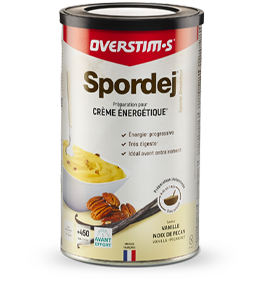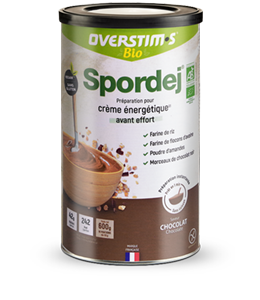Before a sporting event, it’s essential to provide your body with the nutrients it needs to optimize your performance while avoiding any feeling of heaviness or digestive discomfort.
Should you really finish your meal 3 hours before a race or long training?
One of the most applied rules, and probably one of the least well-founded! A full meal actually takes much longer to digest. In 3 hours, the digestive effort is at its maximum… and the available energy at its minimum! In fact, it’s just as inadvisable to set off on a full stomach as on an empty one.
The feeling of a “settled” stomach reassures many athletes, giving them the impression of being able to hold out longer and be more efficient. However, exerting oneself when the body is in the throes of digestion inevitably leads to digestive disturbances that are detrimental to the athlete.
It’s better to play around with the composition of your last meal than to force yourself to eat it several hours before departure.
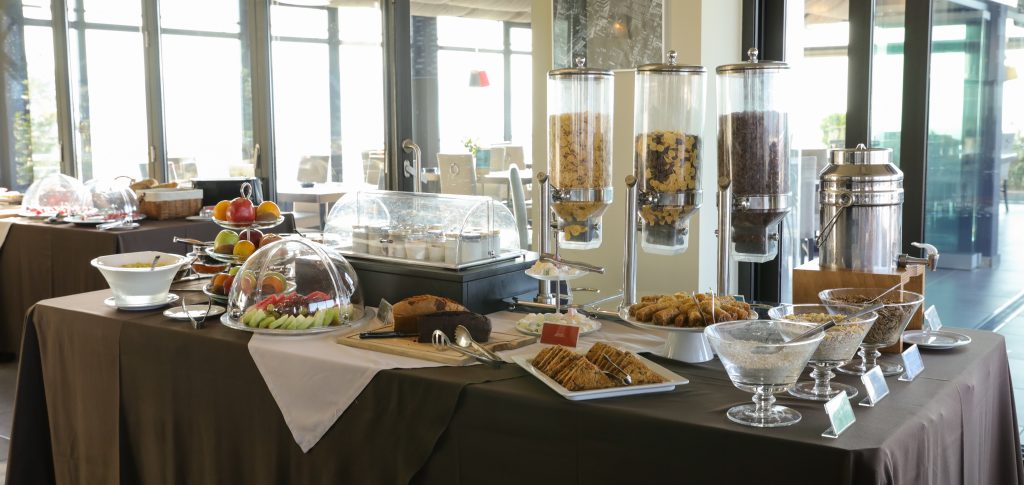
What foods should I avoid before a race or long training session?
The last meal should be as energetic and easily digestible as possible. Here is a non-exhaustive list of foods to avoid or limit before an event:
- Viennoiseries, pastries.
- Excess jam, butter and spreads weigh down the stomach.
- For savory breakfast aficionados, deli meats, sausages and cheese should be avoided, as these foods are very fatty and have a long residence time in the stomach.
- Tightly brewed coffee, large quantities of coffee, highly infused tea: these can cause digestive problems and accentuate dehydration during the event.
- High-fiber foods such as walnuts, hazelnuts, oat bran, oat flakes, wheat bran, wholemeal breads, unripe fruit, berries (passion fruit, blackcurrants, redcurrants, raspberries, blackberries, etc).
- Foods containing lactose, such as cow’s or goat’s milk, yoghurt, butter, fromage frais etc.
What’s the ideal last meal before a race?
Before a race such as a cyclosportive, triathlon, marathon, half-marathon or trail, your last meal should fulfill two objectives:
- Replenish your energy levels by topping up your glycogen stores.
- Limit digestive problems during the race.
Your last meal before the race must be :
- rich in carbohydrates and provide good-quality protein,
- easily digestible and easily assimilated,
- low in fat,plow in fibre (avoid wholemeal bread, fruit juices or raw fruit).
Most importantly, your nutritional protocol (what you eat and when you eat it) must have been validated beforehand during training. No tests on the competition day!
The Gatosport (energy cake) OVERSTIM.s is the ideal last meal before an endurance effort. It meets all the criteria of digestibility and complete nutritional intake.
Did you know? Gatosport (energy cake) is the first energy cake on the market, created in 1982 by OVERSTIM.s.
The many advantages of Gatosport (energy cake) OVERSTIM.s compared to a traditional breakfast:
- It has a high energy content thanks to its complex and simple carbohydrates.
- It provides good quality protein.
- It’s easy to digest, preventing intestinal problems during the race and leaving you in full possession of your resources.
- It can be consumed up to 1 hour before the start of the race, thanks to its high digestibility. You’ll benefit from an appreciable sleep gain so you can rest properly on the last night before your competition.
- If you’re on the move, you can prepare your Gatosport (energy cake) in advance. It keeps for 3 to 4 days in cling film.
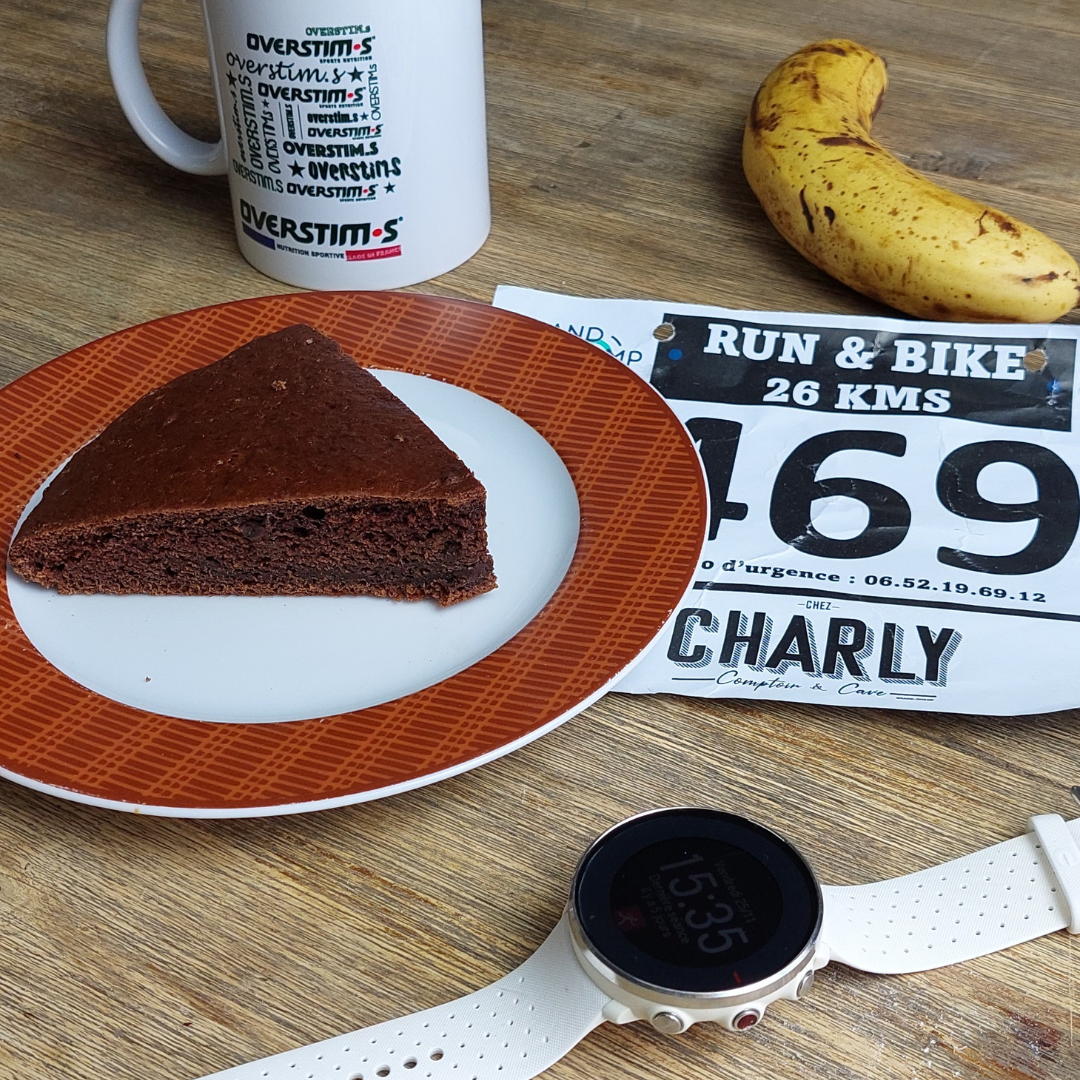
Is the pre-race meal different for each type of event?
Whether breakfast precedes a half, marathon, ultra-trail, cyclosportive or triathlon, the main principles remain the same : digestibility and a sufficiently complete composition including complex and simple carbohydrates and good-quality proteins.
On the other hand, the quantity can sometimes be different: marathon runners (for example), given their longer energy expenditure, will need to eat a slightly larger pre-race meal (maximum 1/2 Gatosport).
The need for free-radical-fighting antioxidant nutrients may be greater for longer events.
How to manage your pre-event meal on the road?
If you don’t sleep at home, you can prepare your Gatosport (energy cake) in advance, and keep it in cling film for 3 to 4 days.
Another alternative is Spordej an energy cream version of Gatosport (energy cake). It requires no cooking and can be consumed 15 to 30 minutes before the start of the race.
Spordej is a quick-to-prepare, energy-boosting and easily digestible preparation for everyday use.
Simply pour the desired amount of Spordej into a small bowl and mix with water or a plant-based drink (almond, hazelnut, rice, etc.). Ready in a matter of seconds, it’s the solution to the headache of the last meal before your event.
Spordej also accompanies you on a daily basis during training periods and is perfect to consume :
- Before a morning workout
- Before a session during your lunch break
- After work if you’re planning a late afternoon workout
- Before a late workout if you’re not sure whether to eat a full dinner or just a snack
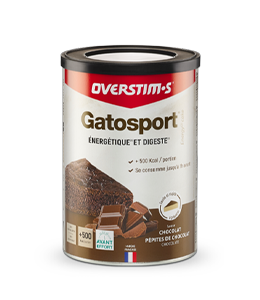
Gatosport (energy cake)
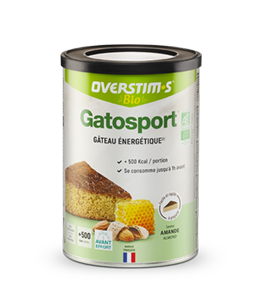
Gatosport bio
